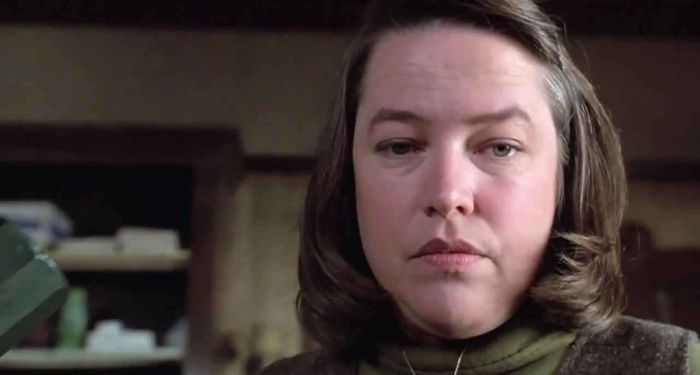
This content contains affiliate links. When you buy through these links, we may earn an affiliate commission.
A couple of years ago, fellow Rioter Jessica Avery wrote this article about Stephen King’s Misery and how it was an allegory for his opiate addiction. After reading that, I was eager for a reread of the novel while keeping that in mind. True to form for most voracious readers, I did not actually get to it until the end of last year, when it was selected for of my book club’s monthly pick.
Within the first few pages of the reread, I came to the realization that Annie Wilkes is the most terrifying of King’s villains. This fact is something that both Paul and the reader realize this very early on in the novel, specifically chapter 4 where he has the thought that “Annie Wilkes was dangerously crazy.”
You may be asking yourself why I think this. After all, she doesn’t have any supernatural abilities. She’s not an extraterrestrial being who eats terrified children, a vampire, or whatever the hell Randall Flagg is. At her core, she is completely human and that is why she stands on her own when it comes to literary villains.
This can be boiled down to two specific qualities that Annie shows throughout the novel. Now honestly there is more than just this which give her this title but these are the two that stand out the most for me. And, as a fair warning, there will be spoilers.
1. HER SUPPOSED SELFLESSNESS
The book opens with Annie rescuing Paul on her own after he crashes his car during a blizzard. Despite the events of the novel, had she not done that, he surely would have frozen to death in his car. On top of that, she used her skills as a nurse to keep him alive and help with the pain. While this ended up being a detriment to Paul because of his addiction to the fictional Novril and all of the other traumatic things that Annie put him through, she certainly sees both as an act of goodwill.
The Fright Stuff Newsletter
The latest and greatest from the world of horror
Thank you for signing up! Keep an eye on your inbox.
By signing up you agree to our terms of use
When Paul goes exploring later in the book, he finds a scrapbook of newspaper clippings and other memorabilia that Annie has put together. One of the first things he finds is numerous obituaries for elderly people. As Paul reads the clippings, he realizes that she acted as an ‘Angel of Death’ in killing these people. In her mind they were “old and sick” or more accurately “rats in a trap” (pg. 192), a phrase that references pages 172 and 173. That is when she killed a rat that got caught in one of her basement traps, by squeezing it to death.
In both instances, she was acting in a way she believed to be merciful. She didn’t think she was wrong for it. But she still murdered innocent people and held a man hostage. Because if her intentions were pure, she would have notified the authorities about Paul being there.
2. HER SELFISHNESS
Another one of Annie’s unsettling memories that Paul comes to is a newspaper clipping on page 185, which references an apartment fire that took the lives of five members of the Krenmitz family. That name triggers a memory and he recalls a story that Annie told him earlier after he wrote his first attempt to revive Misery.
After reading this first draft, she tells him has to try again because it’s not fair. She goes on to clarify her reasoning by telling him a story about how she use to go see chapter-plays with her brother when they were younger and how she spent hours daydreaming how they would resolve the cliffhanger the next week, including “if [she] had to babysit Mrs. Krenmitz’s four brats downstairs. [She] used to hate those little brats” (pg. 107).
While it’s never explicitly stated that Annie set the fire, the fact that she kept it in her book is telling in and of itself. She didn’t want to watch the kids anymore so she did something to ensure she would never have to.
It also goes without saying that Annie forcing Paul to bring Misery back to life when he was ready to write other books is selfish. Towards the end of the novel, she only kept him alive so he could finish the manuscript. Because, if we’re being honest with ourselves, Annie had no intention of dying with Paul; not when she had her own Misery Chastain novel to reread over and over again.
While these qualities are something that all human share, it is the extreme lengths that Annie goes to that makes her stand out. This is in addition to the way she justifies her actions. While most of us have it in us to act within our best interests, it is highly unlikely we would match Annie’s actions.
I doubt anyone would set fire to a building just to get out of baby-sitting mischievous children or keep a beloved author hostage because they didn’t like how they chose to end a story. Annie truly has no moral compass, but even more scary is that she thinks she does. She justifies everything that she does since to her, it was the right thing to do.
And more, she does this all just as a regular human being. When you think of everything she did and not just what I highlighted here? Then she truly is one of the most terrifying villains ever and has earned her permanent place in literary pop culture.

